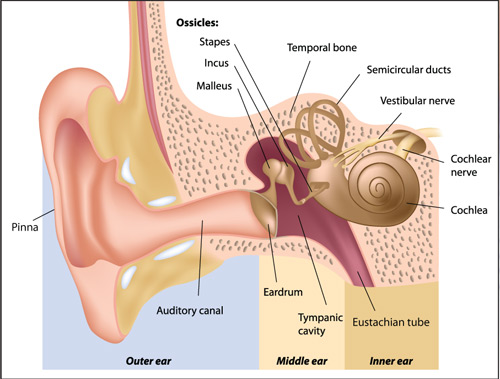In the first few years of life, your child’s ability to hear is a crucial aspect of his or her social, emotional, and cognitive development. Even mild/ partial hearing loss can affect your child’s ability to speak and understand language, so it is vital that you pay attention to your child’s ability to hear.
A simple hearing test can determine whether or not your child is born with hearing loss. Even if your child is normal, you must monitor his or her hearing as hearing loss can happen later in life due to infections, trauma, and damaging noise levels.
In order to be certain, you should have your child undergo a Neonatal Hearing Screening Test, which gives immediate information about the baby’s hearing status. The most commonly applied test is using OtoAcoustic Emission (OAE).
There are three possible causes of hearing loss, namely congenital (birth defects of the pinna – ear lobes, ear canal, ossicular chain, cochlea, or internal auditory nerves), physical trauma or injury (slapping a child can cause his or her eardrums to be damaged), or as a result of infections (otitis media effusion).
Types of hearing loss
There are four types of hearing loss:
- Conductive Hearing Loss (CHL) – sound transmissions are impeded in the external and/or middle ear.
- Sensorineural Hearing Loss – problems with inner ear or auditory nerves.
- Mixed Hearing Loss – conductive and sensorineural hearing loss occurring at the same time.
- Auditory Neuropathy Spectrum Disorder – the brain is unable to decipher sounds because of damage to the inner ear or auditory nerves.
Because your child’s hearing is so important, you must remain alert to any signs or symptoms of possible hearing loss, such as:
In babies
- They are not surprised or startled by loud noises.
- They do not turn to look at the source of sounds from 6 months onward.
- By the time they are one, they still haven’t managed to say simple words like “papa” or “mama”.
- They only turn to look at you when they see you, but not when you are out of sight and call to them.*
- They may seem to hear some sounds but not others.
In toddlers
- They experience delays in starting to talk.
- Their speech is poorly pronounced and not clearly articulated.
- They consistently fail to follow your directions.*
- You need to constantly repeat yourself when you talk to your child in order to be understood.
- They watch TV or listen to music with high volume.
- They frequently speak very loudly, even when the surroundings are quiet.
* Note: This may also be due to inattention or just ignoring you on their part, but don’t discount the possibility that it could be symptomatic of a partial or complete loss in hearing.
You should take the extra effort to observe and analyse your child’s reactions to their surroundings, especially how they react to sounds or to you when you talk to them.
Please consult with your child’s paediatrician the moment you suspect that your child could be suffering from hearing loss, and find out about available treatment options.







Komen